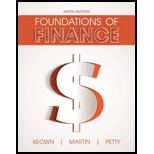
Foundations of Finance (9th Edition) (Pearson Series in Finance)
9th Edition
ISBN: 9780134083285
Author: Arthur J. Keown, John D. Martin, J. William Petty
Publisher: PEARSON
expand_more
expand_more
format_list_bulleted
Question
Chapter 5, Problem 21SP
Summary Introduction
To determine: The
Expert Solution & Answer
Want to see the full answer?
Check out a sample textbook solution
Students have asked these similar questions
Hello tutor need soln
Calculate dividends for this
Need solution for this qn
Chapter 5 Solutions
Foundations of Finance (9th Edition) (Pearson Series in Finance)
Ch. 5 - Prob. 1RQCh. 5 - The processes of discounting and compounding are...Ch. 5 - Prob. 3RQCh. 5 - Prob. 4RQCh. 5 - Prob. 5RQCh. 5 - Prob. 1SPCh. 5 - Prob. 2SPCh. 5 - Prob. 3SPCh. 5 - Prob. 4SPCh. 5 - (Compound value) Stanford Simmons, who recently...
Ch. 5 - (Future value) Sarah Wiggum would like to make a...Ch. 5 - Prob. 7SPCh. 5 - Prob. 8SPCh. 5 - Prob. 9SPCh. 5 - Prob. 10SPCh. 5 - Prob. 11SPCh. 5 - Prob. 13SPCh. 5 - Prob. 14SPCh. 5 - Prob. 15SPCh. 5 - Prob. 16SPCh. 5 - Prob. 17SPCh. 5 - Prob. 18SPCh. 5 - Prob. 19SPCh. 5 - Prob. 20SPCh. 5 - Prob. 21SPCh. 5 - Prob. 22SPCh. 5 - Prob. 23SPCh. 5 - (Solving for PMT of an annuity) To pay for your...Ch. 5 - Prob. 25SPCh. 5 - Prob. 26SPCh. 5 - (Loan amortization) On December 31, Beth Klemkosky...Ch. 5 - (Solving for r of an annuity) You lend a friend...Ch. 5 - Prob. 29SPCh. 5 - (Compound annuity) You plan on buying some...Ch. 5 - (Loan amortization) On December 31, Son-Nan Chen...Ch. 5 - (Loan amortization) To buy a new house you must...Ch. 5 - Prob. 33SPCh. 5 - Prob. 34SPCh. 5 - Prob. 35SPCh. 5 - Prob. 36SPCh. 5 - Prob. 37SPCh. 5 - (Compound interest uith nonannnal periods) a....Ch. 5 - (Compound interest with nonannual periods) After...Ch. 5 - Prob. 40SPCh. 5 - (Spreadsheet problem) To buy a new house you take...Ch. 5 - (Nonannual compounding using a calculator) Jesse...Ch. 5 - (Nonannual compounding using a calculator)...Ch. 5 - (Nonannual compounding using a calculator) Fords...Ch. 5 - Prob. 45SPCh. 5 - (Nonannual compounding using a calculator) Dennis...Ch. 5 - Prob. 47SPCh. 5 - (Calculating the effective annual rate) Youve just...Ch. 5 - Prob. 49SPCh. 5 - Prob. 50SPCh. 5 - (Present value) The Kumar Corporation is planning...Ch. 5 - (Perpetuities) What is the present value of the...Ch. 5 - (Complex present value) How much do you have to...Ch. 5 - (Complex present value) You would like to have...Ch. 5 - Prob. 55SPCh. 5 - Prob. 56SPCh. 5 - Prob. 57SPCh. 5 - Prob. 58SPCh. 5 - (Present value of a complex stream) Don Draper has...Ch. 5 - (Present value of a complex stream) Don Draper has...Ch. 5 - (Complex stream of cash flows) Roger Sterling has...Ch. 5 - (Future and present value using a calculator) In...Ch. 5 - Prob. 1MCCh. 5 - Prob. 2MCCh. 5 - Prob. 3MCCh. 5 - Prob. 4MCCh. 5 - Prob. 5MCCh. 5 - Prob. 6MCCh. 5 - Prob. 7MCCh. 5 - Prob. 8MCCh. 5 - Prob. 9MCCh. 5 - Prob. 10MCCh. 5 - Prob. 11MC
Knowledge Booster
Learn more about
Need a deep-dive on the concept behind this application? Look no further. Learn more about this topic, finance and related others by exploring similar questions and additional content below.Similar questions
arrow_back_ios
SEE MORE QUESTIONS
arrow_forward_ios
Recommended textbooks for you

What Does ROI (Return On Investment) Really Mean?; Author: REtipster;https://www.youtube.com/watch?v=Z6ThJvNr1Dw;License: Standard Youtube License